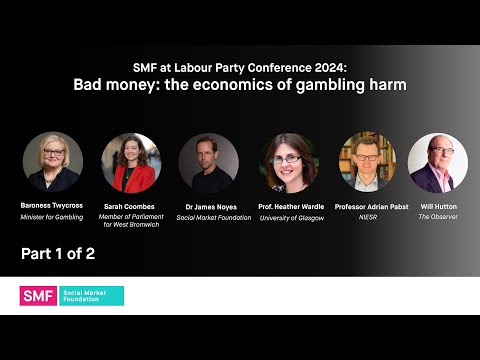Bad money: the economics of gambling harm | Social Market Foundation | Part 1

Opening remarks from Dr James Noyes, Social Market Foundation:
‘Good morning and welcome to this Social Market Foundation panel event on gambling and the economy. My name is James Noyes. I am a Senior Fellow of the SMF and the author of several reports on gambling policy.
The premise of today’s session is the current debate over the value of the gambling industry to the UK economy.
The Betting and Gaming Council states that the industry supports over 110,000 jobs and pays over £4bn in tax.
It claims that if Government regulates the sector too much, jobs will disappear, tax revenue will be lost, and consumers will migrate to the black market.
On the other hand, when we look more closely at those figures, we see that the online betting, bingo and gaming sector – a sector which, it should be noted, last year took £6.5bn Gross Gambling Yield – that this multi-billion pound sector directly employs just 10,000 people.
Also relevant to the debate is the fact that this sector has a fiscal presence offshore in tax havens like Gibraltar. And not all these companies pay UK corporation tax.
In terms of the sector’s economic activity in the UK, some research suggests that gambling takes away from consumer spend in other retail sectors. A pound lost in a betting shop is a pound not spent elsewhere on the high street, where the economic multipliers are more meaningful.
In terms of those high streets, I am sure that everyone in this room has noticed how there seems to be betting shops everywhere. Research has shown that they are concentrated in areas of higher social deprivation. The Bennett Institute for Public Policy at the University of Cambridge has provided analysis showing how betting shop density is correlated with higher levels of income deprivation.
The same trend is found with online gambling. Data from the University of Liverpool and the National Centre for Social Research shows that twice as many online gaming accounts belong to customers in the most deprived areas.
Finally, the White Paper recognised that gambling is linked to harm and that harm carries a cost, because of the burden placed on public services, health services, and through the impact on unemployment and crime. This fiscal cost of harm is estimated to exceed £1bn – although I should add, in the name of balance, that there has been some disagreement over the methodology involved in reaching that figure.
This is the framing for today’s discussion: one the one side, the industry’s claims about tax and jobs, on the other side, academic research demonstrating that gambling adds little value to the economy, but instead represents a cost to the public purse.
It also opens important questions relevant to the Government’s economic mission. The Chancellor has talked about creating wealth and economic growth. How does the gambling industry create wealth? In Earlier this year she highlighted the importance of security for family finances and for the national economy. She called this ‘Securonomics’. How can the gambling industry, which by definition has a business model dependent on risk and loss, fit into her vision?
Finally, many in the Labour Party have talked about fairness and the social value of corporations: purposeful companies that do not profit from creating problems.
How does that apply to online gambling companies creating addictive content on smartphones?
Those are some of the questions that we will touch on today. I am delighted that we are joined by a truly stellar panel of experts and parliamentarians.
First, Professor Heather Wardle of the University of Glasgow, and lead author of the Gambling Commission’s recent Gambling Survey for Great Britain.
Second, Baroness Twycross, Minister for Gambling and also for DCMS business in the House of Lords.
Third, Will Hutton, columnist for the Observer, and author of many bestselling books on the state of Britain, including his most recent book, This Time No Mistakes.
Fourth, Sarah Coombes, MP for West Bromwich, someone who has campaigned for many years for stricter rules around online gambling, particularly around sites and apps marketed at young people.
Finally, Professor Adrian Pabst, Deputy Director at the National Institute of Economic and Social Research, and a contributing author to the New Statesman.
www.smf.co.uk
